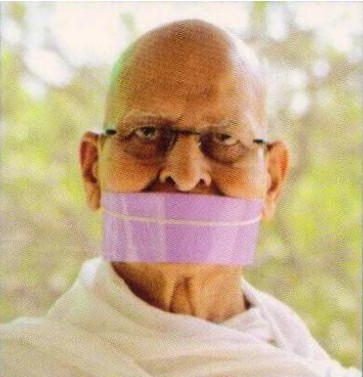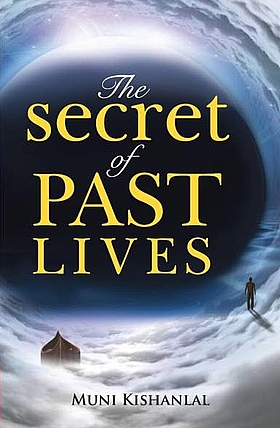The idea of previous birth and rebirth is not only of significance to religious or spiritual leaders but also to those who are rationalistic and analytical about such ideas/experiences/beliefs. If we do not accept the idea of the past births or of the future births of the soul, we will have to rethink our lives and the way we live it. Why? The fundamental premise in our argument is about the existence of the soul. If we do not accept the idea of the existence of the soul then whose birth or rebirth are we talking of? Then it will be like the philosophy of the Charavakas: "rinam kritva ghritam pi bet"; meaning enjoy even if you have to borrow to do so...in other words, enjoy with no strings attached. (Literally, the phrase means borrow if you have to and drink ghee...the first part of this phrase says live happily as long as you do. It suggests that you neither have to be grateful or indebted to anyone...).
If I am, then;
Who am I?
Where did I come from? Where will I go?"
Along this strain of thought, man begins to wonder where or which heaven he will go to after death. These questions create the desire to know about previous births.
Following excerpts are from Life after Death: Essence and Truth, written by Pandit Shri Ram Sharma. The aim is to convey that the idea of rebirth is not exclusive to Jainism alone. Even other religions believe in it, says Pandit Sharma with supporting evidence.
Consciousness does not begin and end with birth and death, the soul lives on to take on subsequent births. As far as Indian religion or philosophical thought is concerned, it has always believed in eternity of soul and rebirth. This is the basis of spirituality that the whole world believes in and various religions have given various theories regarding the concept of rebirth. All religions believe in the imperishability of the soul and a body that is mortal. Immortality of soul and belief in rebirth has been the basic concept of Hinduism. All Indian religious scriptures have repeatedly stressed on the concept of rebirth. Even the 'Puranas' testify this and it is recorded in the voice of the Supreme that He will take birth again and again. The Bhagavad Gita likens rebirth to the act of changing clothes. A living being takes birth again and again. The idea is that those who live a virtuous life are rewarded with the heavens and those who commit crimes go to hell. In the 22nd sloka of 2nd chapter of the Bhagavad Gita Sri Krishna tells Arjuna, "Just as when man discards his old clothes and wears new ones, he is discarding only the clothes not himself. Similarly the soul leaving the old body migrates to the new." In the 4th chapter, 5th sloka Sri Krishna says, " Both of us have taken many births. Since I am divine, I know my previous births and you as a human are not able to recollect them."
Generally, it can be said that the two major religions of Christianity and Islam do not believe in rebirth. But if one goes through them very closely, one finds they too believe in it, if indirectly.
The great scholar Professor Max Mueller in his treatise on' Six Systems of Indian Philosophy' has established the fact that Christianity is not averse to the idea of rebirth.
Plato and Pythagoras have established this fact in their philosophical treatises. Roman scholar Origen, 3rd century A.D. has clearly stated that repeated birth may turn a man into angel and an angel into man. Even the wicked who atones for his sin, may, with the chain rebirth take birth as a good human being or as an angel. The famous scholar of Judaism, Jojephus has given the example of Jewish soldiers who were encouraged to go to the battlefield with the promise that after meeting death they will be born again. He has written, '... all souls are pure'. A good man's soul enters a good man whereas the wicked ones are punished. After some time they are sent again to take another birth. The cycle goes on. People who commit suicide are sent to a dark underworld, which is known as Hades. The idea of Jojephus is very similar to the explanation given in Isha Upanishad:
Andham tamaha pravishanti ye ke cha atmahano janaha
Those who end their own life, go to dark recesses of the world
In Judaism, rebirth is termed 'Gilgulim'. In the 'Kabbalah' too rebirth is accepted[1]. In Zohar, their religious text, it is clearly stated that every soul has to take repeated births. The oldest sect of Christianity is the Gnostic sect. All Gnostic scholars were wise and noble people and they believed in rebirth. During the 3rd and 4th centuries A.D, a sect known as Manichaeism, founded by an Iranian prophet Mani, was popular and was briefly the main rival to Christianity. Eventually it faded out (approximately by the 14th century). That faith also believed in rebirth. The famous historian Edward Gibbon has written in his book, 'The Decline and Fall of Roman Empire', that disciples of Jesus believed in rebirth. According to him the famous preachers of Christianity like Clemens, Alexandrinus, Synesius and Chalcidius also believed in rebirth; even some of the European scholars and philosophers like Goethe, Hume and Schopenhauer believed in the concept of rebirth. In the "Wisdom of Solomon", Lord Jesus says that 'John the Baptist' is the reincarnation of Aliz (Ilyas). In the third chapter of Bible, paragraphs 3-7, he says, 'Don't be surprised if I say you will be reborn'. Saint Paul is supposed to be the reincarnation of Jesus. Ancient preacher of Christianity - Origen has said that man has to undergo rebirth according to his past deeds. Western philosophers like Plato, Plotinus, Kant, Tennyson and John Masefield believed in the concept of rebirth.
The great Greek philosopher Pythagoras believed that the soul transmigrates. This takes place according to one's deed in the previous birth, which is known as 'Karma' according to Hindu philosophy. Plato has also said that those souls, which have attained purity and not at all interested in the body or the material are not reborn. They are freed from the cycle of birth, death and rebirth. G.L. Flair in his book "Uncertain Border' has said that on death we do not go anywhere but remain here itself as we have always been.
Therefore it is, that even though rebirth may not be articulated as such or in great detail by religions across the world, it seems to have been an underlying premise to hold people's conduct in place. Indeed, the idea of rebirth ensures that life is led with rectitude.
In Arabic the transmigration of the soul is known as Tanasukh. Even though the Quran does not explicitly state that there is rebirth, it not denied either. It is said, 'man, you have to go towards your God. He is Allah. With effort and pain you have to climb the rungs of the ladder to Him."
There are many ayats in the Quran which, when read closely say that just as creation is followed by its completion and its re-creation, man too is born repeatedly. One of them is like this," I have created you of the earth and I will send you back into the same earth and then recreate you, repeatedly till the end." Another ayat says, "Kephatkaphoorna billahe", that is, how can you refuse Allah, the Merciful One. You were dead. He has given you life again. He will kill you again and revive you again, such that in the end you return to Him. " There are many such examples which talk of the continuity of life after death.
Famous Sufi scholar Saint Maulana Rumi says that he has evolved from plant, insect, animal, bird and finally he is born as human being. He wishes to attain the status of angel for which he is trying hard. According to the ayats in the Quran there are number of Sufi Saints like Ahmad-bin-Sabit, Ahmad-bin-Sabus, Abu-Muslim-Khorasani, Sheikh-ul-Ishraq, Umar Khyaram, Al-Gizali to name a few who are known for their firm belief in the concept of rebirth. They have based their belief on the basis of the chapters 61 to 92 of Soor-tul-mubarak and chapter 55 of Soor-tul-mayada.
The Encyclopedia of Islam throws light on rebirth or Tanasukh extensively. According to it, many Islamic sects believe in rebirth, the Shias being one such. The Encyclopedia of Religion and Ethics clearly states that apart from Indians, Iranians, Parsis, Egyptians, Jews, Greeks and Teutonics believe in rebirth. In the same book, the 12th volume, mention the aborigines of Africa, Australia and America saying that they too believe in rebirth.
Once rebirth was a topic for discussion only among religious leaders and philosophers. Both these areas are predominantly based on faith and without proof for no conclusive evidence can be had on rebirth. So research has moved into the field of science to find evidences. In this context, the kind of evidence gathered by scientists and psychologists has redeemed the doubt about rebirth to a large extent. People are being forced to give up their old beliefs. Indeed rebirth is the next step of our life. It is the measure of our self. This belief lends much morality and hope to our character.
 Muni Kishan Lal
Muni Kishan Lal
